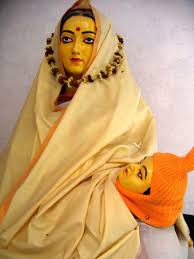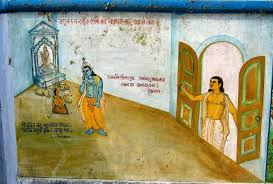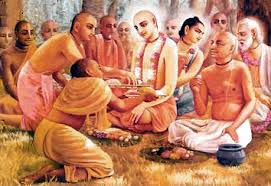Answer Podcast
Video:
Transcription
Question: QA on humility 3 – How can we be humble with those who are exploitative
Answer:
That’s a challenge, no doubt.
If we approach all our interactions with people with a “one size fit all” formula, then it is going to backfire. Krishna also says, “As all surrender to me, I reciprocate accordingly”. We also need to be reciprocal. Reciprocal doesn’t mean that other person is yelling about a small thing, we also start yelling at that person. Here, in this context, being reciprocal means we understand how we can be effective in dealing with particular people.
For example, in the Mahabharata war, we see Bhima is fighting with Duryodhana. Duryodhana has inner animosity and thus he was the cause of the fight. On the other hand, there are Bhishma and Drona who had to fight but their fighting was circumstantial. They were caught in the circumstances by which they had to fight against the Pandavas. They did not have any inner animosity. Externally speaking, Pandavas are fighting with everyone, whoever is in front of them, whoever is challenging them, but the inner disposition with which they are fighting is different. It’s individual.
This might seem a little too subtle or abstract. We need to understand that when dealing with people, our focus should be on getting the service done. Sometimes when we approach a person, he is very cordial. They say there is a problem here and we discuss how it can be resolved and then they resolve it and we are able to get the service done.
On the other hand, there could be somebody else with whom we have some purpose for interacting and they are constantly passing snide comments or just their words are filled with barbs. Now, sometimes if those barbs are just meant to provoke us, we can overlook them and we do what it takes to get the things done.
Sometimes it might be that a person is simply being needlessly provocative, then we speak to them in a way that makes them aware that we also mean business. That doesn’t necessarily mean threatening them or stooping down to their level. The idea is that we need to keep our purpose in focus.
There are many situations when if somebody is exploitative, we need to stand up for ourselves. For example Vidura. Vidura was constantly giving good advice to the Kauravas and they were neglecting his advice. When Pandavas were exiled, they were very angry especially because Kauravas had attempted to disrobe Draupadi. There was an attack of conscience that Dhritarashtra had. Rather, it was actually more of an attack of fear that also had some rumbling of conscience within him. He said, “No, what has happened is terrible. How can I rectify it?” Vidura said, “Only way you can rectify it is call the Pandavas back and give their kingdom to them. Punish Duryodhana for this. Have him removed from all positions of power till he comes back to his senses and stops doing things like these.” This infuriated Dhritarashtra. He said, “You are always partial to the sons of Pandu and you are always against my sons. I have no desire for your presence. You can go wherever you like.” At that time, Vidura left the Kuru kingdom. He went and joined the Pandavas in the forest.
The Pandavas were initially surprised and concerned. Eventually they were happy to have Vidura’s association. All this happened in the evening and night. Next morning, Dhritarashtra had a restless night where he couldn’t sleep and then he felt regretful. “You know, Vidura is my friend. He is my sibling and I want him with me because otherwise I will be completely isolated. There is no one left in my generation. Bhishma is older to me. Duryodhana is younger to me.” So he sent a messenger to call back Vidura.
Dhritarashtra did not exactly, you could say, make a heartfelt apology. He requested Vidura to come back and Vidura came back. Vidura said, “I desire the welfare of both your sons and Pandu’s sons. But naturally, because the Pandavas don’t have a father, so I am concerned about them also.” Anyway, that time Vidura came back. Eventually when the war became inevitable and Duryodhana grievously insulted Vidura and Dhritarashtra remained silent, then Vidura walked away from there. He walked away because he had no desire to fight for the Kauravas against the Pandavas. When they rejected him, he also rejected them.
We see that Vidura was the same person, but he had different approaches. He knew that Duryodhana had a malevolent nature and Dhritarashtra had too much of an accommodating nature towards Duryodhana. Vidura wanted to be around to minimize the damage as much as he could. But once he realized that the war was inevitable and he could do nothing to minimize the damage, he did not want to be a part of the team causing the damage. He walked away. After Dhritarashtra had lost all his hope because all his sons had been killed, then he came back and strongly spoke to Dhritarashtra. He had Dhritarashtra become renounced.
The idea is that we have one purpose, but we can have multiple approaches. Even when somebody is exploitative, if there is a possibility for us to be there and minimize the damage. However, once it becomes clear that we can’t do anything, rather by being here, we are ourselves getting damaged or we are becoming a part of a thing that is causing damage and we can’t do anything to minimize it, then don’t be a part of it. We have one purpose, but may use different strategies based on time, place, and circumstances.
End of transcription.





 By Satsvarupa Das Goswami
By Satsvarupa Das Goswami By Kalakantha Dasa
By Kalakantha Dasa By Mayapur Sasi dasa
By Mayapur Sasi dasa

 Dear Giriraj Maharaja,
Dear Giriraj Maharaja, HH Bhaktimarga Swami fondly remembers the beautiful personal qualities of HH Bhakti Charu Swami
HH Bhaktimarga Swami fondly remembers the beautiful personal qualities of HH Bhakti Charu Swami






 Gopi Gita Devi Dasi Blossoming our Future - ISKCON Towaco NJ July 19 2020
Gopi Gita Devi Dasi Blossoming our Future - ISKCON Towaco NJ July 19 2020
 By the ISKCON GBC Strategic Planning Team
By the ISKCON GBC Strategic Planning Team By the ISKCON GBC Strategic Planning Team
By the ISKCON GBC Strategic Planning Team















 By Sacinandana Swami
By Sacinandana Swami